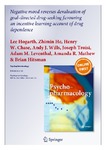Negative mood reverses devaluation of goal-directed drug-seeking favouring an incentive learning account of drug dependence
| dc.contributor.author | Hogarth, L | |
| dc.contributor.author | Zhimin, H | |
| dc.contributor.author | Chase, HW | |
| dc.contributor.author | Wills, Andy | |
| dc.contributor.author | Troisi II, J | |
| dc.contributor.author | Leventhal, M | |
| dc.contributor.author | Mathew, AR | |
| dc.contributor.author | Hitsman, B | |
| dc.date.accessioned | 2015-06-09T08:37:21Z | |
| dc.date.available | 2015-06-09T08:37:21Z | |
| dc.date.issued | 2015-06-05 | |
| dc.identifier.issn | 0033-3158 | |
| dc.identifier.issn | 1432-2072 | |
| dc.identifier.uri | http://hdl.handle.net/10026.1/3354 | |
| dc.description.abstract |
BACKGROUND: Two theories explain how negative mood primes smoking behaviour. The stimulus-response (S-R) account argues that in the negative mood state, smoking is experienced as more reinforcing, establishing a direct (automatic) association between the negative mood state and smoking behaviour. By contrast, the incentive learning account argues that in the negative mood state smoking is expected to be more reinforcing, which integrates with instrumental knowledge of the response required to produce that outcome. OBJECTIVES: One differential prediction is that whereas the incentive learning account anticipates that negative mood induction could augment a novel tobacco-seeking response in an extinction test, the S-R account could not explain this effect because the extinction test prevents S-R learning by omitting experience of the reinforcer. METHODS: To test this, overnight-deprived daily smokers (n = 44) acquired two instrumental responses for tobacco and chocolate points, respectively, before smoking to satiety. Half then received negative mood induction to raise the expected value of tobacco, opposing satiety, whilst the remainder received positive mood induction. Finally, a choice between tobacco and chocolate was measured in extinction to test whether negative mood could augment tobacco choice, opposing satiety, in the absence of direct experience of tobacco reinforcement. RESULTS: Negative mood induction not only abolished the devaluation of tobacco choice, but participants with a significant increase in negative mood increased their tobacco choice in extinction, despite satiety. CONCLUSIONS: These findings suggest that negative mood augments drug-seeking by raising the expected value of the drug through incentive learning, rather than through automatic S-R control. | |
| dc.format.extent | 3235-3247 | |
| dc.format.medium | Print-Electronic | |
| dc.language | en | |
| dc.language.iso | en | |
| dc.publisher | Springer Science and Business Media LLC | |
| dc.subject | Incentive learning | |
| dc.subject | Goal-directed learning | |
| dc.subject | Drug-seeking | |
| dc.subject | Negative mood | |
| dc.subject | Depression | |
| dc.subject | Allostasis | |
| dc.subject | Discriminative stimuli | |
| dc.subject | Motivating operations | |
| dc.subject | Negative reinforcement | |
| dc.title | Negative mood reverses devaluation of goal-directed drug-seeking favouring an incentive learning account of drug dependence | |
| dc.type | journal-article | |
| dc.type | Article | |
| plymouth.author-url | https://www.webofscience.com/api/gateway?GWVersion=2&SrcApp=PARTNER_APP&SrcAuth=LinksAMR&KeyUT=WOS:000359659600012&DestLinkType=FullRecord&DestApp=ALL_WOS&UsrCustomerID=11bb513d99f797142bcfeffcc58ea008 | |
| plymouth.issue | 17 | |
| plymouth.volume | 232 | |
| plymouth.publication-status | Published | |
| plymouth.journal | Psychopharmacology | |
| dc.identifier.doi | 10.1007/s00213-015-3977-z | |
| plymouth.organisational-group | /Plymouth | |
| plymouth.organisational-group | /Plymouth/Admin Group - REF | |
| plymouth.organisational-group | /Plymouth/Admin Group - REF/REF Admin Group - FoH | |
| plymouth.organisational-group | /Plymouth/Faculty of Health | |
| plymouth.organisational-group | /Plymouth/Faculty of Health/School of Psychology | |
| plymouth.organisational-group | /Plymouth/REF 2021 Researchers by UoA | |
| plymouth.organisational-group | /Plymouth/REF 2021 Researchers by UoA/UoA04 Psychology, Psychiatry and Neuroscience | |
| plymouth.organisational-group | /Plymouth/Research Groups | |
| plymouth.organisational-group | /Plymouth/Research Groups/Institute of Health and Community | |
| plymouth.organisational-group | /Plymouth/Users by role | |
| plymouth.organisational-group | /Plymouth/Users by role/Academics | |
| dc.publisher.place | Germany | |
| dcterms.dateAccepted | 2015-05-20 | |
| dc.identifier.eissn | 1432-2072 | |
| dc.rights.embargoperiod | No embargo | |
| rioxxterms.versionofrecord | 10.1007/s00213-015-3977-z | |
| rioxxterms.licenseref.uri | http://www.rioxx.net/licenses/all-rights-reserved | |
| rioxxterms.type | Journal Article/Review |


